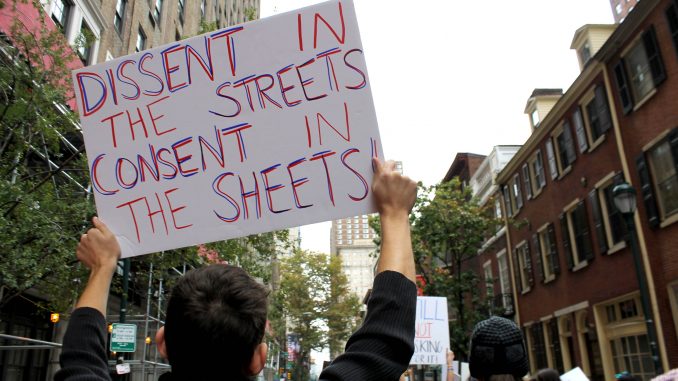
Under gray skies at the 2015 March to End Rape Culture, Nellie Fitzpatrick relayed the story of Chrissy Lee Polis, a transgender woman who was beaten in 2011 after attempting to use a women’s bathroom.
“This happened to Chrissy because of how these people perceived her,” said Fitzpatrick, the city’s director of LGBT Affairs. “Because she wasn’t good enough to simply do what every single person here does every day: go to the bathroom.”
Three days after the march, Philadelphia witnessed the 18th murder of a transgender woman of color in America this year when 22-year-old Kiesha Jenkins was attacked in Logan. Police arrested a man in connection to the murder yesterday.
“We’re sold on the idea that women’s bodies, brown bodies, disabled bodies are not entitled to rights,” speaker Dr. Timaree Schmit said to audience members.
While this year’s event focused on the elimination of rape culture, speakers tackled other issues related to the feminist movement like violence against transgender women.

Intersectionality is the concept that components like race and class play a significant role in feminism. This was a word that speakers did not hesitate to emphasize.
“So you’re privileged in some ways and marginalized in others, and it’s important to acknowledge all of those different things,” Schmit said. “It’s not just fighting sexism. You can’t just fight sexism. You can’t just fight racism. You have to look at it holistically.”
The March to End Rape Culture started in 2011, and was previously called the Slutwalk. The original title was coined after a Toronto police officer advised teenage girls to “avoid dressing like sluts” to escape sexual violence.
This year, the event featured speakers like La’Donna Boyens of the Positive Women’s Network and Celena Morrison of the Trans* Wellness Project. Audience members gathered in the brisk weather, donning apparel varying from sweatshirts to bras to pasties. Between performances and speeches, participants filed through the city in a 2.3-mile walk of solidarity.
This year’s march was the first to include live music. Sarah Muhl, who performed at the event, is the singer, songwriter and guitarist for local band The Pretty Greens.
After enduring one too many catcalls, Muhl became so enraged about street harassment that she wrote a song about it. Accompanied by bassist Julia Green and drummer Carly Green, Muhl belted indignant and unapologetic lyrics: “I won’t be abused.”
“That event is extremely empowering, just, I know from marching in it last year just from walking by bystanders who get to experience the march as it’s going by, it’s empowering to them, it’s empowering to the marchers, it’s just a very positive cause that influences everyone involved,” Muhl said.
Poet Destinie Cubler, 17, read her poetry for the first time at the 2014 march. She said she witnessed a girl in the audience crying and began to cry herself.
“They understand the fear you feel when you walk alone at night, Cubler said. “They’ve lived it.”
When Muhl became an organizer, facilitators were working to rebrand the movement to make it more inclusive.
The first step in the renovation process was to remove the word “slut.”
A 2011 letter from the Black Women’s Blueprint, a national human rights organization, expressed disapproval of the title, stating “slut” has different associations for Black women. In 2013, organizers changed the title.
Living up to its aspirations of inclusiveness, the march incorporated new sponsors to further diversity. Temple’s Progressive NAACP and the university’s chapter of Project SAFE, an organization that combats domestic violence, both participated as sponsors for the first time this year.
“I think we’ve made more of an effort to be reaching out to different parts of the city to be like, ‘This is for everybody, it’s not just for 18 to 21 year old white women,’” Schmit said. “Cause that’s definitely a perception of it, it certainly was more true initially. So I’m glad we’re getting a little bit more intersectionality.”
Angela Gervasi can be reached at angela.gervasi@temple.edu.



Be the first to comment